Wisdom was pulled together to implement the concept of sustainable development despite boundaries of time and space. Over 1,000 outstanding young students gathered online, focused on the goal of realizing sustainable development, and jointly probed into innovative solutions. They embarked on a splendid and fruitful journey in Tsinghua University.
In the summer of 2021, Tsinghua Global Summer School 2021 (GSS 2021) officially kicked off with the theme of “Innovations for Sustainable Development.” Lasting 9 days and 216 hours, the GSS 2021 composed of 8 Masterclasses, 8 Youth Forums, 14 SDG Hackathon activities, 2 rounds of Enterprise Virtual Visit, and 3 sessions of Tsinghua Virtual Tour. The young participants, coming from over 151 world-known universities in 96 different countries and regions, spent a memorable summer of their lives.
Focus on Sustainable Development and Guide Young Students to Shoulder Responsibility of the Times
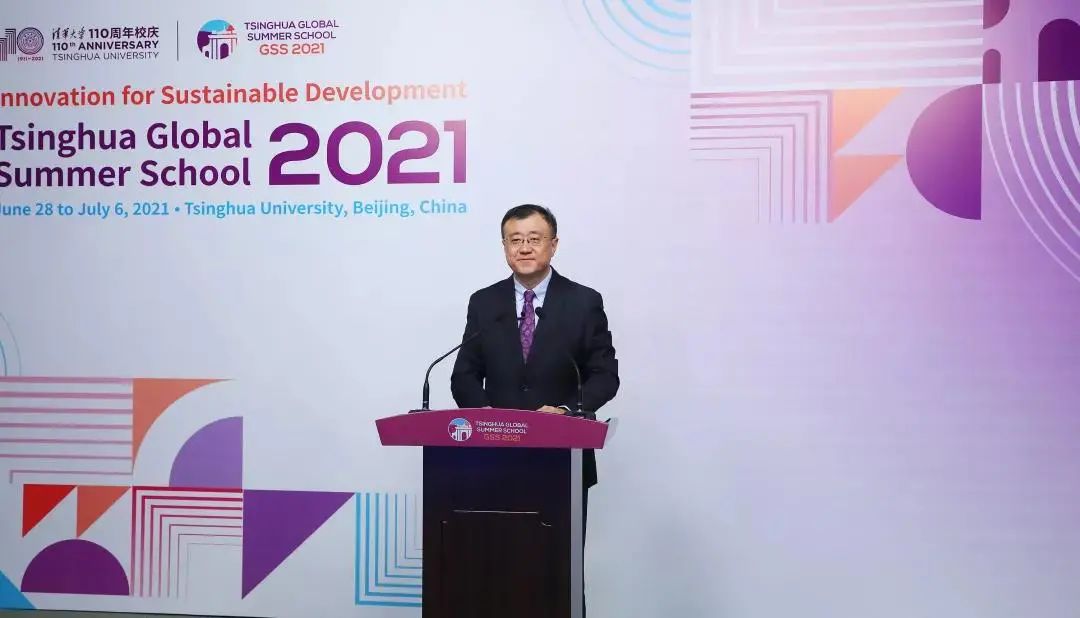
Vice President Yang Bin delivered a speech.
In his remarks delivered at the opening ceremony of GSS 2021 held on June 28th, Tsinghua University Vice President and Provost Yang Bin expressed the hope that, GSS 2021 will play an important role in responding to global challenges and building a community with a shared future for mankind by imparting knowledge, pursuing innovation, and cultivating future leaders. He encouraged each and every participant to be involved, to take action, and to collaborate with each other to apply knowledge gained from the Masterclasses into practical solutions for sustainable development in the future.
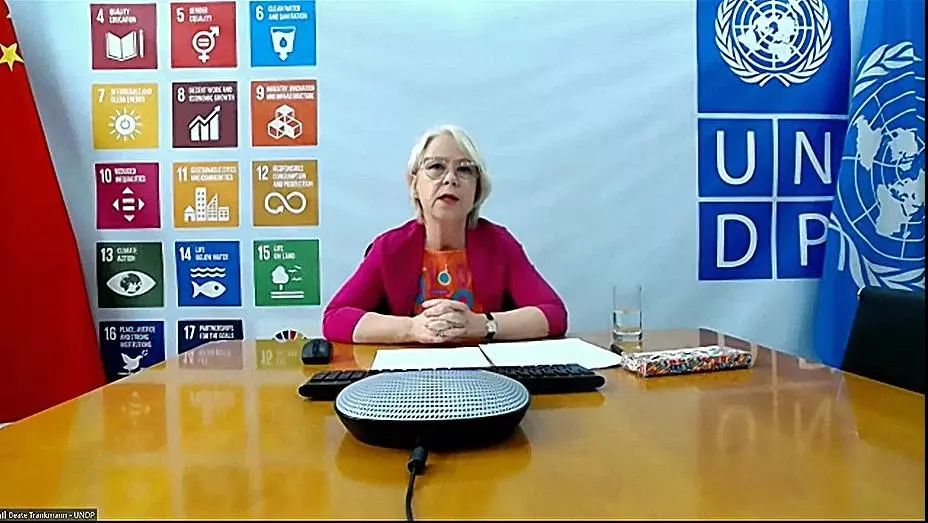
Ms. Beate Trankmann delivered a speech.
Ms. Beate Trankmann, United Nations Development Program (UNDP) Resident Coordinator in China, said in her speech that Tsinghua GSS 2021 brings together young, bright minds from all over the world, creating a rare opportunity for the coming together of wisdom and the promotion of innovative solutions. She expressed her appreciation of the theme of “Innovation for Sustainable Development” for the Global Summer School, which she believes reflects Tsinghua University’s deep commitment to the Sustainable Development Goals (SDGs).
During the 9-day online program, GSS students attended Masterclasses and Youth Forums, formed into groups in the SDG Open Hack, and jointly proposed innovative solutions to realizing the UN SDGs as a contribution to the world’s sustainable development.
This series of productive exploration would be impossible without the meticulous course design and teacher staffing. Professor Li Jinliang, Dean of International Affairs of Tsinghua University, noted that, “Through a great variety of courses and activities, the GSS motivates outstanding youngsters from all over the world to think about urgent social issues and encourages them to make positive contributions to the world’s sustainable development.”
Themed “Innovation for Sustainable Development”, the GSS 2021 is an unconventional summer school program organized collaboratively by 22 academic institutions, including 17 schools and departments, 3 overseas institutions, and 2 international associations for higher education initiated by Tsinghua. Bringing together Tsinghua’s quality teaching resources, the GSS 2021 invited well-known professors from home and abroad to give lessons, and introduced the concept of sustainable development in such forms as online lectures, online seminars, online visits, and online performances. What’s more, for the first time, the SDG Open Hack was introduced to integrate academic study with innovation and interaction, and thus help students know about the opportunities and challenges of sustainable development, and transform challenges into the motivation for study and personal development.
Centering on sustainable development, the 8 Masterclasses of GSS 2021 brought together experts and scholars from various fields to give superb lectures with profound theories explained in simple language. The lectures touched on such subjects as “The Chinese Economy: Prosperity and Prospects”, “Positive Psychology for the Post-Pandemic Era”, “Sustainable Design and Creative Thinking”, “Tsinghua University and the Sustainable Development Goals”, “Global Transition Towards Carbon Neutrality”, “Two Slopes, Two Approaches to Sustainability: Designs of the National Ski Jumping Centre and Shougang Big Air for the Beijing Winter Olympics 2022”, and so on.
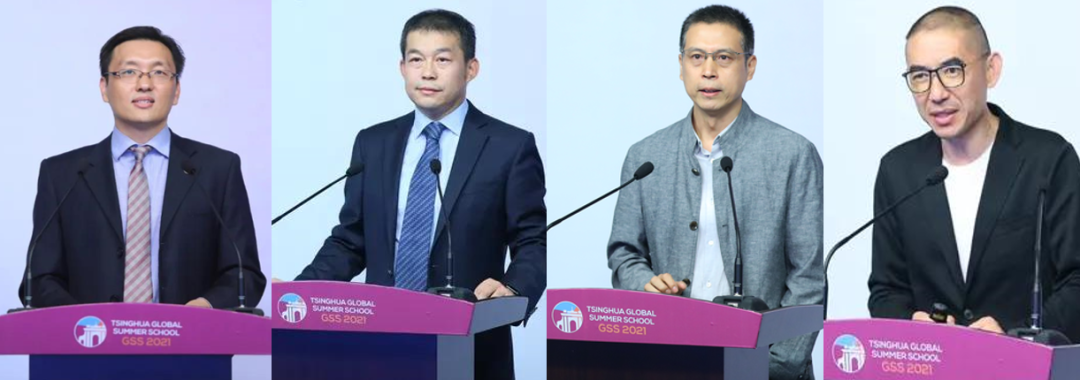
Zhu Xufeng, Teng Fei, Liu Xin, and Zhang Li (from left to right) gave lectures.
In the Masterclass “Tsinghua University and the Sustainable Development Goals”, Professor Zhu Xufeng, Associate Dean at the School of Public Policy and Management (SPPM) of Tsinghua University, focused on Sustainable Development Goals (SDGs), analyzed the process of sustainable development and the challenges facing the world, introduced China’s substantial efforts in implementing SDGs, and elaborated on the key role played by universities, especially Tsinghua University, in sustainable development. He also systematically illustrated the Chinese wisdom and strength that Tsinghua University has contributed to global sustainable development from the perspectives of talent cultivation, scientific research, social contribution, and cultural heritage and innovation.
In the Masterclass “Global Transition Towards Carbon Neutrality”, Teng Fei, Associate Professor and Deputy Director of the Institute of Energy, Environment and Economy (IEEE) of Tsinghua University, introduced the pathways, policies and challenges of the global transition to carbon neutrality, and from the perspectives of climate science, economics, ethics and political science, presented hotspot issues and frontier areas in the research of climate change. What’s more, he talked about the significant impacts of climate change on natural ecosystems and human social systems, and analyzed the carbon neutrality targets proposed by various countries to control temperature rise and their implications. As he emphasized, climate change is one of the greatest risks facing human society and only by strengthening cooperation and accelerating transformation can we effectively address this challenge. He encouraged students to actively engage in researches and actions in response to climate change and thus make contribution to developing innovative solutions to global climate change.
In the Masterclass “Sustainable Design and Creative Thinking”, Professor Liu Xin from the Academy of Arts & Design of Tsinghua University elaborated on the ways to respond to sustainable development challenges from local to global levels through “sustainable design”, and create solutions that benefit society, economy and natural environment. As to applications of sustainable design, Professor Liu took research programs as examples, including the “lettuce house: sustainable lifestyle hub”, the design of sunshine school toilets in rural areas, and the research and design of nearshore floating garbage collection equipment based on wave power”, which demonstrated the localized implementation of several SDGs. Professor Liu encouraged students to realize their sustainable design with the tool of design thinking and emphasized that “everyone can use design thinking to improve the world in a proactive and creative way”. “There are no best, perfect solutions. Sustainability is a goal, direction and vision for us to explore constantly.”
In another Masterclass, Professor Zhang Li, Architect-in-Chief of the Zhangjiakou Zone and Shougang Big Air for the Beijing 2022 Olympic Winter Games and Dean of Tsinghua University’s School of Architecture, detailed the design of the National Ski Jumping Centre and Shougang Big Air for the Beijing Winter Olympics 2022. He pointed out that, the design of the Beijing Winter Olympics 2022 venues stresses on post-game use and sustainability. The Beijing zone featuring ice-sports is primarily focused on the reuse of existing structures and the integration of the new venues with the city’s long-term renovation and urban renewal projects. In comparison, the planning and design of the Zhangjiakou zone mainly focus on the creation and integration of the outdoor environment. According to Professor Zhang, availing the opportunity of Winter Olympics, the National Ski Jumping Center serves to promote economic revitalization and human progress in mountainous areas by constructing infrastructure and developing an international destination for outdoor sports, and Shougang Big Air aims at offering new ideas for Beijing’s urban renewal and community building by advancing the reuse of industrial heritage. Both venues embody the sustainability strategy of the Beijing 2022 Winter Olympics in their own way.
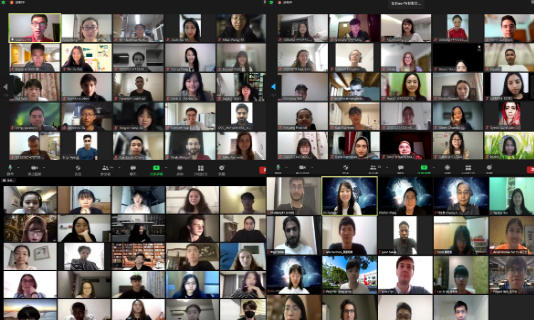
Students engaged in heated discussions.
Furthermore, the continuing 8 Youth Forums provided an open, special interdisciplinary platform for participating students and inspired them to think about the future of the world. Themes of the forums include “The Role of Enterprises in Achieving the Sustainable Development Goals”, “Green Construction: Whether the Chinese Solution Suits Latin America” “Academic Integrity and Sustainability Competence”, “University of Wilderness and Sustainable Development”, and “Student Success by Developing Global Competence for All”.
At the Youth Forum themed “Green Construction: Whether the Chinese Solution Suits Latin America” undertaken by the Tsinghua University Latin America Center, attendees shared knowledge on China’s green architecture solutions and the applicability of green architecture in Latin America, and illustrated the great efforts and contribution that Tsinghua University had made in growing the green architecture sector in China with lively cases. Guests at the forum also introduced the concept and application of green development in architectural design and the building of hospitals, schools and houses in Colombia and Peru. During the Q&A session, GSS 2021 students, based on their expertise and the circumstances in their own countries, actively expressed opinions in heated discussions.
Huang Xiyu from the University of Hong Kong said, “from the sustainable development goals and the Chinese economy, to design thinking and innovative leadership, GSS 2021 gives me new perspectives which are quite promising and sustainable. The students here come from different cultural backgrounds and have different hobbies. They have shared how various countries and regions in the world are coping with COVID-19, which has truly broadened my horizons.”
As an international student from Malaysia, Liu Kaiheng, who will soon be enrolled in Tsinghua University, said from his own experience, “the Masterclasses are very rich in content. They have strongly inspired me to think creatively on the idea of sustainability. Thanks to GSS 2021, I have learned a lot of knowledge and grown maturer in many ways. I wish I could contribute more to the UN SDGs in the future.”
Born and bred in the U.S., Chinese-American student Cai Jianhao from the University of California Berkeley has always aspired the Chinese culture on the other side of the ocean. According to him, “every Masterclass offers unique ideas and opinions, showing the efforts and progress made by China in achieving sustainable development. GSS 2021 also offers an international exchange platform, where students from all around the world and I talked on the cloud, shared opinions, and exchanged ideas and thoughts. It has been truly rewarding for me.”
SDG Hackathon Inspires Innovation Potential of the Young Participants
At 4 am, Moscow, when many students were sound asleep, Nikita Baranov, an undergraduate of Tsinghua University from Russia, was already sitting in front of the computer screen for the rich and colorful online courses offered by GSS 2021. Unlike campus courses, the openness and diversity of summer school filled him up with new ideas and curiosity for knowledge. Across the ocean, another student who was also fighting the time difference was Matheus Power from the MIT. He was trying to find solutions to the assigned program in preparation for the SDG Hackathon.
The time of profound global challenges asks for global solutions. Yang Bin, Tsinghua University Vice President, noted in the welcome address of GSS 2021 that “it is an era of opportunity and action, and one that requires us to rely on our values of openness, integration, and resilience to drive forward. More openness promotes values that are compassionate, inclusive, and equitable. More integration helps us break through physical boundaries, barriers across disciplines, and technological limitations to make greater contributions to society. More resilience exhibits adaptive strength and leadership that inspires, and turns challenges into opportunities for growth and knowledge. It is for those missions that the GSS is embarking on a new journey.”
In designing the Hackathon for openness and innovation, the GSS 2021 planners, together with the x-lab of Tsinghua University (a university-based education platform designed to foster student creativity, innovation and entrepreneurship), set 14 different sub-hacks following the theme of “innovation for sustainable development” and the goals of “independent learning, intelligence teaching, and inclusive and quality education.” Teachers from various schools and departments of Tsinghua, including the School of Social Sciences, Academy of Arts & Design, Shenzhen International Graduate School, School of Environment, and Institute for AI International Governance, joined students from all over the world to work out creative solutions for achieving the UN SDGs. The Hackathon was highly practical and enjoyed extensive participation. Each of the 14 sub-hacks focuses on a different area, including economy, education, society, liberal arts education, artificial intelligence and leadership. Students were guided to understand global issues more deeply, and took a firm step forward in tackling the challenges shared by mankind.
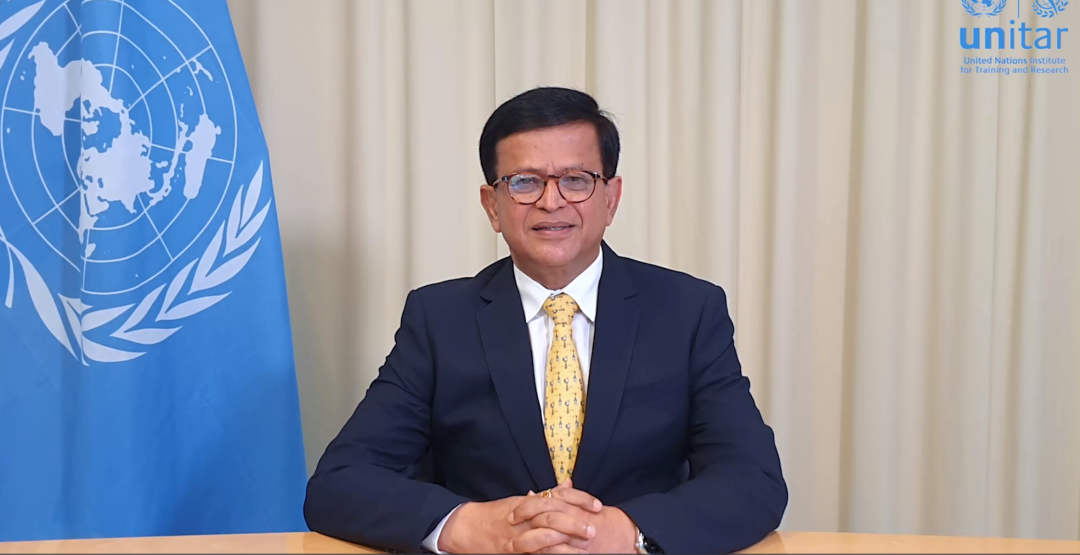
Mr. Nikhil Seth delivered remarks.
Mr. Nikhil Seth, Assistant Secretary-General of the United Nations and Executive Director of the United Nations Institute for Training and Research (UNITAR), delivered remarks at the GSS 2021 closing ceremony, “the SDG Hackathon is not only an important event of creativity and innovation, but also a platform for dialogue to contribute wisdom and solutions to the Sustainable Development Goals. In a hackathon, hundreds of students, faculty members, and corporate executives can come together to achieve impactful innovation and jointly tackle global sustainability challenges.” As Mr. Seth rightly pointed out, it was the hackathon that brought many students to understand sustainability issues and to think seriously about how to help address the common challenges of mankind.
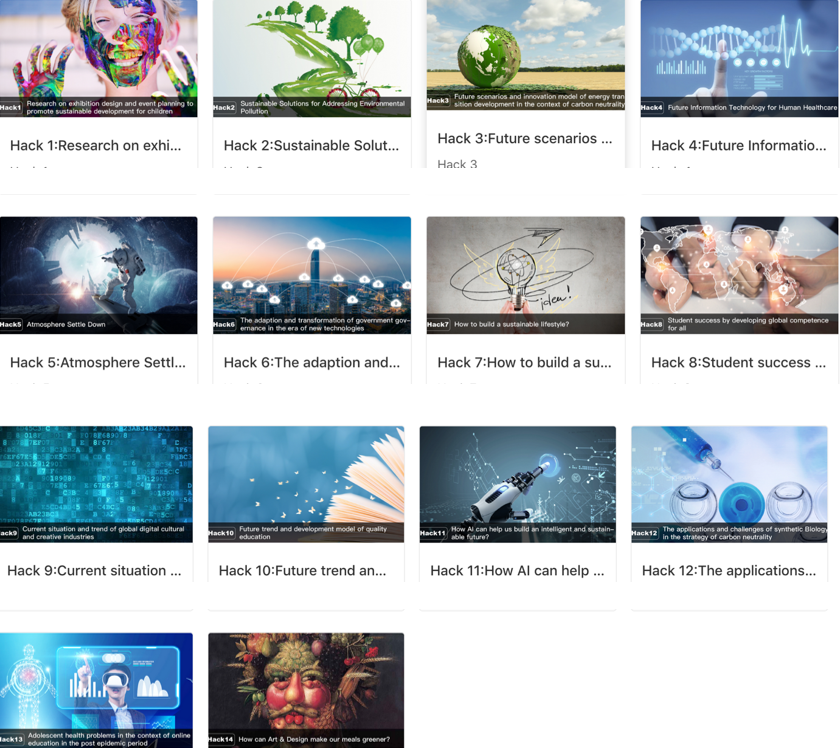
SDG Hackathon sub-hacks
Professor Li Jizhen, Associate Dean of the School of Economics and Management of Tsinghua University and Representative Professor of the Global Summer School SDG Hackathon, believed that “the SDG Hackathon is a result of cooperation, a strongly practical and creative platform for students across the world to openly work together, thus enhancing their global perspectives.”
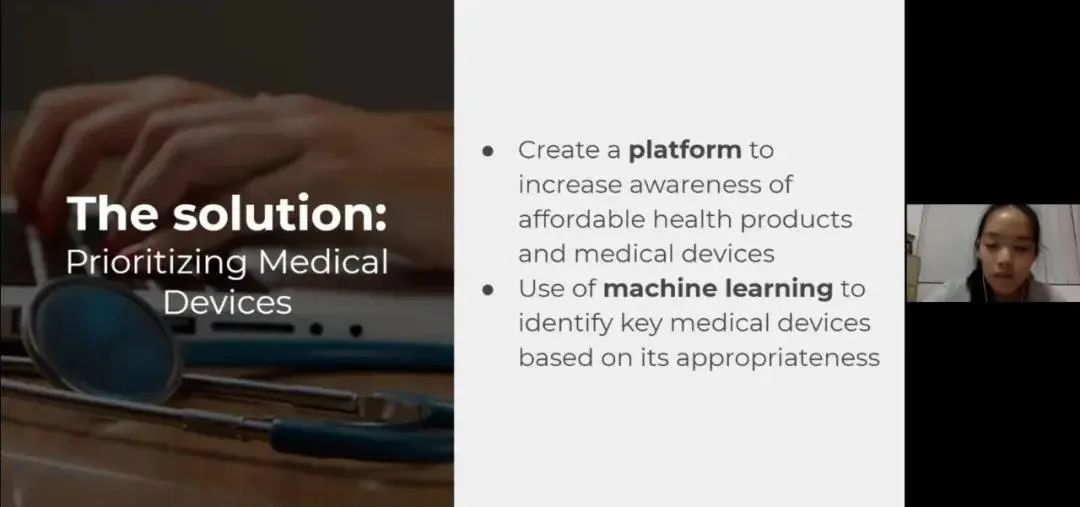
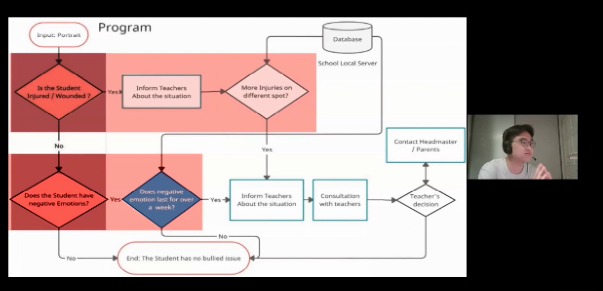
SDG Hackathon presentations
Kilian Hikaru Scheutwinkel, a doctoral student of Cambridge University, chose the hack “How AI Can Help Us Build an Intelligent and Sustainable Future?” He said that “my research direction is related to the technological front of AI, but I’ve never set foot in the area of sustainable development. I quite enjoyed exploring ongoing challenges and tackling them with AI technologies together with other students.”
Hoong Hao Yap from the Imperial College London chose the hack “Sustainable Solutions for Addressing Environmental Pollution” and felt quite excited. “Every class sparked new ideas, and each discussion inspired better solutions,” he said, “In the past two years I have specialized in engineering science, and my way of thinking is rather defined. But the GSS has really opened up my global perspectives. This is something that school courses could not offer.”
Miki Kurihara from the University of Tokyo expressed gratitude to the mentors of his hack, “they led us to further understand the program and to find new solutions to existing problems. Everyone was so passionate and motivated about what they were doing, and I’m really glad to have been one of them.”
Baranov Nikita, an undergraduate of Tsinghua University, was deeply impressed by the SDG Hackathon this year. She believed that as a member of the new generation, it is both her opportunity and responsibility to change the world.
Innovate Summer School Education Models to Help Students Build Global Competence
Tsinghua University Global Summer School (GSS) focuses on expanding students’ international vision and global competence. More than 60 undergraduates from the School of Humanities, Tsinghua University, attended the GSS 2021 together with their peers from different countries and regions worldwide to explore innovation for a sustainable future.
In today’s globalized world, countries are engaging in increasingly intensive cross-border cooperation and exchanges, and also facing many urgent challenges that require coordinated response. At the closing ceremony of GSS 2021, Li Jinliang, Dean of International Affairs of Tsinghua University, pointed out three keywords–social responsibility, innovation and interdisciplinary–to highlight this year’s global summer school. Professor Li hoped that all students, through the study at GSS 2021, enhanced global vision and leadership, better understood the interconnected challenges and opportunities facing our world, and jointly created a community with shared visions transcending borders and cultures.
Zhong Zhou, Associate Professor of the Institute of Education (IOE) at Tsinghua University, also one of the main designers of GSS, gave a detailed review of the consistent efforts that Tsinghua University has been making in enhancing students’ global competence. She noted that “making ‘Global Competence’ one of the core targets of talent cultivation and integrating it into the university’s educational system” was set as a strategic guideline as early as in 2016 when Tsinghua University was formulating and implementing its global strategy. “Global competence” is the “capability to learn, work, and live with others from different culture origins, to embrace opportunities and challenges in the future”. According to Zhong Zhou, the University started to organize summer schools annually since 2016 as a way to achieve the goal of global competence development. The GSS 2021 was carried out in an innovative way featuring richer contents and diversified forms. Through discussions of opportunities and challenges facing the world, China’s solutions, wisdom, and contribution to global sustainable development were fully presented, which effectively promoted interdisciplinary exchanges and cooperation among faculties and students of different cultural backgrounds and fields of interest. In addition, special emphasis was placed on encouraging young students to, in the process of seeking common grounds while reserving difference, act on the mission and shoulder the responsibility of promoting the world’s peaceful development. This not only enabled international students to better understand the Chinese culture, but also helped Chinese students enhance their cultural self-awareness and confidence.
“Offering lively classes designed for global competence development, the GSS focuses on helping both Chinese and foreign students continuously enhance the six core competencies of world knowledge and global issues, language, openness and respect, communication and collaboration, self-awareness and confidence, and morality and responsibility,” said Liao Ying from the Center for Global Competence Development (CGCD) at Tsinghua University. “The students brought forward various questions and solutions regarding SDGs, during which they deeply explored into the roots of their own cultures and the common values of the humankind. They are expected to maintain the perspective of sustainability in their future careers. In the meantime, how to play an active part in cross-cultural teams was another challenge. The online courses and activities adopted by the GSS this year opened up new possibilities for future education.”
Wang Ziting, a sophomore from the School of Humanities, Tsinghua University, said that the greatest gain for her in this year’s GSS was broader global vision and deeper understanding of global competence. During the summer school, studying with students from all over the world with different thoughts and insights, she learned how to embrace cultural differences without holding any prejudice, face uncertainties and changes squarely, and communicate and exchange actively with those from different cultural backgrounds. In this process, she enhanced both confidence and global competence.
He Miao from the School of Humanities, Tsinghua University, said that the GSS provided an opportunity for her to meet with so many outstanding young peers from different countries and regions. They worked together on developing solutions to issues of global sustainable development and gained deeper insights into sustainability from exchanges of diverse opinions. Also, she experienced how cultural background can affect individuals’ modes of thinking and behavior. In addition, her English proficiency was greatly improved for in-depth exchanges on professional topics with foreign students. She said this was an unexpected benefit. She added that Tsinghua University attached great importance to the development of students’ global competence. To provide students with more opportunities for enhance their global competence, the University has been expanding online and offline resources, building various international platforms, and integrating global competence development into the whole education processes from courses to activities home and abroad.
The 9-day summer school provided students with an opportunity to learn about China more comprehensively and deeply, presented the profound history and cultural heritage of Tsinghua University, and demonstrated that the University is striding forward in a more open, integrated, and resilient manner.
William Francis Orbell from Oxford University said that “the Tsinghua GSS 2021 gave me a chance to learn about China in depth. During the virtual tours, I felt the unique charms of the Chinese culture and got so attracted. If the COVID-19 is eliminated in the future, I hope to come to Tsinghua University to participate in the global summer school, and experience the Chinese culture in person.”
Peng Yun Ting from National University of Singapore said, “Tsinghua GSS is very different from other summer programmes as it is very innovative and interdisciplinary. Through 9 days of study, I actually saw an open, strong, and inclusive China. China is a responsible major country that has been making great contributions to the world in addressing sustainability issues.”
Muhammad Afi Adli BinHasnul from Malaysia said with emotions that “Tsinghua GSS provided students from all over the world a platform to communicate with and learn from each other. I got to know many friends with shared interests who are warm and friendly, just like we are a family. I will never forget Tsinghua University and the GSS 2021.”
As Tsinghua University President Qiu Yong said in the opening remarks at the opening ceremony of Tsinghua GSS 2020, “Here in Tsinghua, education is taking place everywhere at every moment. All efforts made by our faculty and the University are the best education for our students. I am glad to see the Tsinghua GSS is kicking off with these beliefs. Universities of tomorrow will be more open, more integrated, and more resilient; learning of tomorrow will be more self-driven; teaching of tomorrow will be more intelligent; and education of tomorrow will be more inclusive.” Since 2020, Tsinghua University has been holding online global summer schools annually, and will continue to do so in the future, to serve enhanced cooperation and deepened exchanges with international partner universities. In the future, more and more outstanding students from the world will join the Tsinghua GSS community, fully understand Tsinghua and know more about China, integrate themselves into the world, and embrace a more sustainable and brighter future for us all.
Article by the Office of International Affairs
Photographed by Jia Yi
Edited by Wen Xingyu
Reviewed by Lv Ting
Originally published on https://www.tsinghua.edu.cn/news